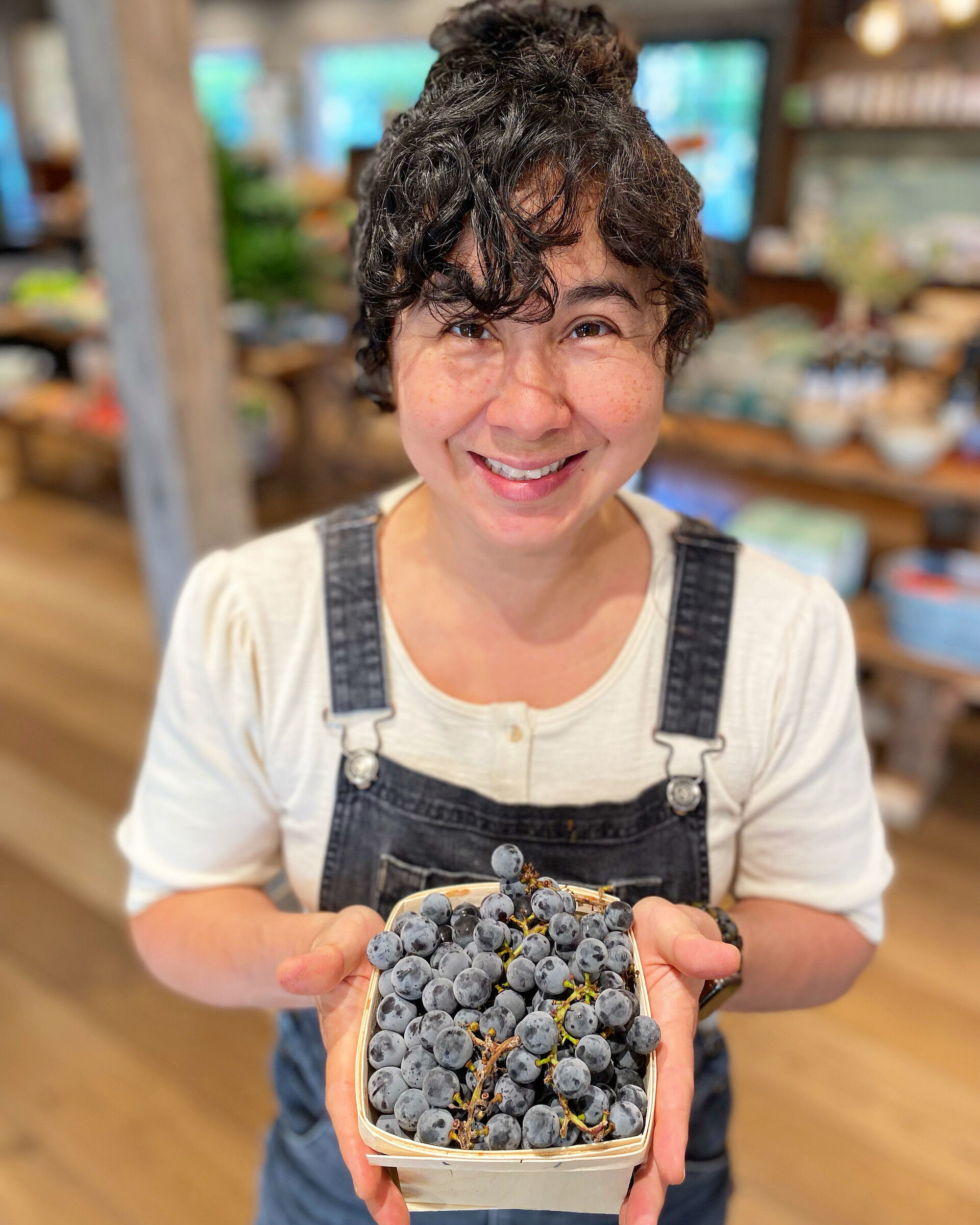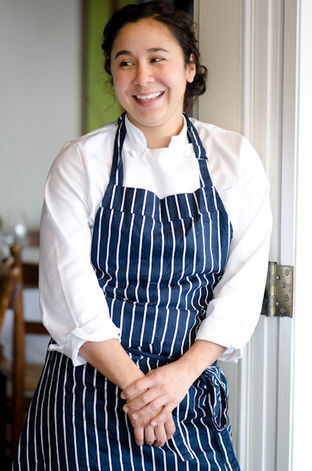Mayumi Hattori: How A James Beard Finalist Became Nantucket's Local Grocer
Virginia Bullington •

From a young age, Mayumi Hattori’s family impressed upon her the importance of eating ethically and joyfully. Her mother hailed from Spain and her father from Japan, making her a first-generation American.
“If you think about both cultures, meals and seasonality are really important,” said Hattori, an island chef and the co-founder of the local grocer Pip & Anchor on Amelia Drive. “Since both of my parents were immigrants here, those values were not diluted in my household.”

Growing up, Hattori saw how both of her parents used food to connect to a sense of home and routine in their new lives in the United States.
“It is the immigrant story, you find those bits to make this distinct country more familiar,” said Hattori, “My dad for instance would make sure on the weekends to cook Japanese food for us or take us out to eat so that at least Japanese culture was communicated through meals. We grew up around that kind of passion.”
It is no wonder, then, that Hattori was drawn to pursue a culinary career.
“I had friends that were working hundred-hour weeks but I got to do something with my hands that resonated,” said Hattori. “They had paychecks that made them happy, but I was doing something that made me feel like I was truly in vibration.”
However, this path was not immediately welcomed warmly by her parents, who had fostered her love of cooking in the first place.
“Both of them were, dare I say, disappointed when I chose to finally get into food, they both wanted me to pursue something that was more financially lucrative, more high profile, more secure,” said Hattori. “Security was a keyword, when I first started getting into cooking, they were both like, ‘you are working so physically hard!’”
Hattori found her way into the hospitality industry in a roundabout way. She received a Bachelor’s in Psychology from the University of California Berkeley and went on to become a district manager at Abercrombie and Fitch.
“I was miserable doing that job. It gave me a lot of opportunities at a young age, in terms of managing multiple stores, huge staffs, hiring processes, which was incredible and unheard of at 25,” said Hattori. “But on the flip side of it, the culture of it was toxic and exclusive.”
She was being primed to take on more responsibility and move to a home office where she could focus on visuals and merchandising.
“But that just meant that I would be taking another step into confirming that culture, so I knew I needed to get out,” said Hattori. “I thought, I’m just going to take a risk and try cooking, why not? I was considered old at the time but I thought, ‘You know what, I’m going to try this for a while, if it doesn’t work I can always try something else.’”
So, at 26, Hattori pivoted and enrolled in culinary school.
“It is something that my parents didn’t necessarily have the luxury to do, and many people don’t think they have the luxury to do,” said Hattori. “That’s the other story of immigrant parents, they want more for their kids than what it is that they come into the country with.”

At Le Cordon Bleu in Pasadena, Hattori connected with a small group of other “older” students who had also had an internal reset and opted to change their careers. At this time in the early 2000s, the Food Network was becoming increasingly popular and the concept of celebrity chefdom was peaking.
“I don’t want to say I bought into that, but cooking always made me happy, and the benefit of the celebrity chef culture was that it showed me, oh wow, you can do something that you are passionate about and be successful at it,” said Hattori. “It gave me a different picture of what cooking could be.”
Hattori was also influenced by her upbringing in California, which grows over a third of the nation’s vegetables and where one is forced to see the connection between the produce in the grocery store and the human hands who harvested it.
“When I was growing up we boycotted grapes because they were being sprayed with DDT at the time so food activism has always been important in my life,” said Hattori. “Field workers' rights were also always something I was cognizant of because it was literally in my face, we lived right next to fields that grew strawberries and on my drive to school I would see migrant workers every single day.”
In this way, Hattori saw that the small decisions she made every day, such as whether or not to eat grapes, or where she bought groceries, mattered.
“My mom would always drive far out of the way to shop at co-ops and at farmer’s markets instead of grocery stores. There are people who live pretty poorly but choose to spend their money on flashy handbags, or sunglasses, or cars but that wasn’t what I grew up with,” said Hattori. “We were not a well-off family but we prioritized and celebrated what we put in our bodies.”
These core values, of buying ethically sourced food, eventually led Hattori to leave her work as a chef and instead focus on making local food available to Nantucketers year-round.
She discovered the island in 2007 after meeting and working with Gabriel Frasca in Boston. When Frasca moved to Nantucket to take over Straight Wharf Restaurant, Hattori figured, like so many before her, to try out the island for a season. The rest has been history.
“I decided I would just work one summer on Nantucket and then figure out if I wanted to stay in Boston or what my next step would be, but I fell for Nantucket hook, line, and sinker,” said Hattori. “It was hard in the beginning, it was a lot of work at first, I walked into a restaurant that was completely understaffed and I didn’t have a day off for two solid months.”
Despite this, the kitchen of Straight Wharf, and the island community as a whole, drew Hattori in.
“The staff there was so warm and inviting, I really fell in love with the culture of things. Coming here felt like coming home to me. In LA I was so used to having relationships with farmers and Boston wasn’t that,” said Hattori. “All of a sudden, being here, it was that again; I know my farmers, I know what they’re bringing, and the produce was so much better than what we had in Boston.”
She became the chef and partner at the Club Car in 2017 where she went on to become a semi-finalist for a James Beard award in 2020. Ironically, the year she was nominated for this prestigious food award, the investors of the Club Car let her go. This, along with the onset of the pandemic allowed Hattori to shift gears and embark on a project that would have a bigger impact on Nantucket’s food system as a whole.
“It is bonkers to me that people don’t bat an eye at spending $1,000 on the phone in their pockets or $100 on a pair of jeans, but literally food becomes us, we are it,” said Hattori. “Food is primary, how is it that we have lost sight of that?”
Thus, she and former Select Board member Rita Higgins started 100 Mile Makers, motivated by this desire to connect small local farmers with people on-island who wanted access to high-quality, locally grown goods. In 2020, 100 Mile Makers shifted from a pop-up to a weekly CSA where customers could order online from a menu of produce and pantry items sourced from within 100 miles of the island, to be picked up the following Friday from Born and Bread Bakery. In 2021, Chris Sleeper, a veteran restaurant manager on Nantucket, joined the team and the trio was able to strike a deal with ReMain Nantucket, which purchased Annye’s Whole Foods on Amelia Drive that year, to give 100 Mile Makers a brick-and-mortar location. After a year of renovations, they opened Pip & Anchor, a grocery store that operates with the same ethic: Where food comes from is important, and the people who harvest or prepare it should be paid fairly and treated humanely.

“It is a luxury to not have to grow your own food, that is really the way we should look at it, because it is hard work and it requires a lot of attention, there are a lot of things that can go wrong,” said Hattori. “We should treat the benefit of being able to go to a grocery store and pick up some beautifully washed kale that has been bundled for us as a luxury.”
Indeed, the prices of produce and goods at Pip & Anchor may be higher than those at the Stop and Shop, but with good reason.
“We mark up what we need to in the store to pay our employees a living wage, to turn on the lights, but also because the farms we buy from are paying their workers a living wage and share the same values we do,” said Hattori. “You can rest assured that when you are buying here you are buying from people who are raising food the right way and paying their people a living wage and are not relying on indentured servitude.”
At the same time, Hattori has also always prioritized lowering barriers to these high-quality food items for those who may not have the financial means or the time to fill up a basket in the store. From the days of the CSA boxes to-go, 100 Mile Makers, and now Pip & Anchor have assembled boxes for food-insecure families on the island. The program has grown to serve over 300 Nantucketers a week, every week of the year.
“When you start paying attention, it doesn’t have to be just about profit margins, you can also use food as an avenue to start affecting change,” said Hattori.
Pip & Anchor has blossomed into a local watering hole where one can stock up on local produce and pantry goods, have a sit-down lunch, or pick up pre-prepared meals to go. They often host pop-ups for local artisans and makers, and in the off-season have put on weekly open mic nights. Hattori is proud that she and her partners have established a place on-island that not only promotes ethical growing, production, and consumption practices but is a gathering place for the community.
“I have basically resigned myself to the fact that I will never be able to make a quick trip here,” laughed Hattori. “There is probably someone you are going to run into!”
